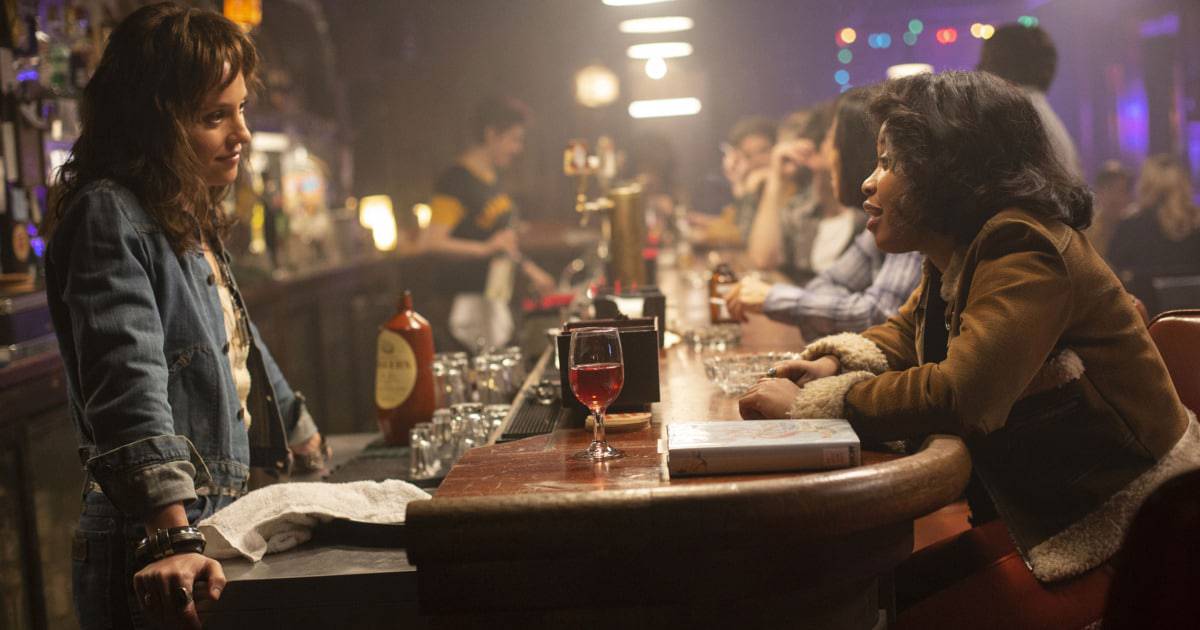
The Deuce’s second season is teeming with books. Sex workers and pornographers flip through Toni Morrison and fairy tales, while a bartender quips about Dickens and keeps her nightstand stocked with women’s lib essays. It’s a fitting choice for the increasingly worthy heir apparent to a lauded show–The Wire–that has so often been compared to a host of great classic novels. When David Simon drops us back into the dazzlingly scuzzy underworld of ‘70s New York City, time-jumping five years forward into the boom of porn and parlors, everyone is trying to get elevated.
Just as The Wire brilliantly portrayed the “organized” part of “organized crime” with humor and complexity, Simon’s latest project (co-created with longtime collaborator George Pelecanos) thrives on laying bare the creative and economic guts of the sex work industry. And just as The Wire deepened season by season, creating a textured portrait of a city that’s always changing but rarely improving, so does The Deuce’s image of its titular Times Square neighborhood continue to sharpen. In the show’s second season, Simon’s and Pelecanos’ creative vision is as expansive and intricate as that of a large-scale fantasy series, with a sprawling, talented cast to match.
When the premiere picks up, Candy (Maggie Gyllenhaal) is steadily gaining success in the pornography industry but is still hungry for the social legitimacy and creative fulfillment that she envisions coming with a career in mainstream filmmaking. During the first season’s promotion James Franco’s put-upon bar owner Vincent Martino was presented as the series’ main character, but Candy is clearly the series’ heart, a fact that showrunners embrace in the first half of season two.
In a series that aims to both portray the real lived experiences of significant ‘70s subcultures and create believable fictional characters, Candy embodies both goals most successfully. Gyllenhaal still imbues the ex-sex worker and current filmmaker-slash-actress with the heavy world-weariness that followed her through season one, but now it’s largely obscured by the gleam of ambition in her eyes, the tentative hope and tenuous power which allow her to confidently pitch ideas to adult film veteran Harvey (David Krumholtz) and anyone else who comes within earshot.
While Candy works her way through the patriarchal trappings of showbiz, the other women who once walked the street also struggle to adapt to their career changes; while most have moved into porn or massage parlors, one character now works in outreach and politics, yet all struggle to move onward and upward in environments that work against them. Characters who felt thin in season one are lent depth as each woman’s story is told with deliberate empathy, spotlighted in storylines about addiction, abuse, and education that never once feel sentimental. Rarely has a series captured the potent mix of daily emotions–fear, shame, pride, joy, bitterness, and about a dozen more–which plague women who work for exploitative men, but The Deuce never shies away from the effects of the implicit violence of these industries’ power structures, which pull even the noblest male characters in.
These men, however, so far fail to match their counterparts’ story arcs in terms of poetry or significance. While increasingly ambivalent Vincent’s mob plotline is still capable of holding our attention, his deadbeat twin Frankie (also Franco, minus a bad wig) wanders irritatingly through each of the early episodes like a pawn slowly crossing a chess board, limping toward some unknown but definite showdown. Officer Alston (Lawrence Gilliard Jr.) offers viewers a vital glimpse into the socio-political landscape affecting the Deuce (newly elected Mayor Koch wants to close the Red Light district for tax purposes), but rarely rises above the role of context-explainer. Meanwhile, loveable gay bartender Paul (Chris Coy) begins his own business venture in a plot that’s intriguing–if dread-inducing–yet inches forward compared to other storylines.
These are minor qualms, made even less significant by the abundance of narrative trust Simon and his team have built up episode to episode. For cultural critics and socially conscious viewers who share Candy’s world-weary sense of distrust, a series about the historic exploitation of women and people of color seems doomed to misstep. Yet The Deuce has impressed with its nuance and ultimately good heart at every turn. As in The Wire, The Sopranos, and other series that were able to draw villains with as much warmth as their heroes, this ragtag group of people–many of them criminals–feel like a family, albeit an unhealthy one. Their motives are as clear and understandable as if they were our own, though their lives are likely very different.
While The Deuce’s second season is technically stunning, offering memorable sequences and visuals which parallel its first with twists both wry and tragic, it’s the series’ humanistic writing and acting that sets it apart from nearly anything else on television. “We should be proud of our perversions!” one character half-sarcastically declares to another in an upcoming episode. He’s right; while Candy searches for the seemingly mythical intersection between art and sex, we’re lucky enough to have already found it. It’s The Deuce, and it’s better all the time.
Related Topics: HBO, the deuce

